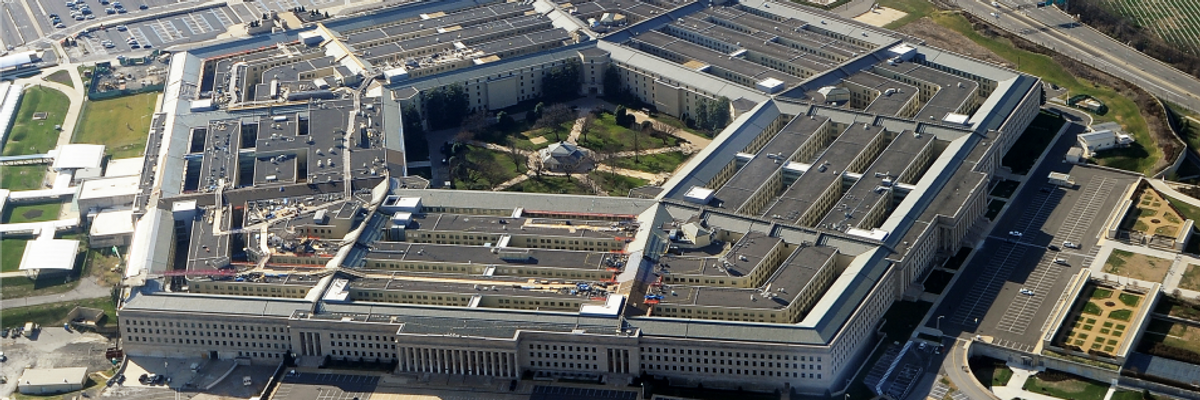Progressive advocacy groups on Friday denounced Sen. Roger Wicker's last-minute attempt to add another $25 billion on top of the United States' already gargantuan military budget--arguing that the Mississippi Republican's proposal reflects Congress' skewed priorities and underscores the need to redirect Pentagon funding to tackle pressing social and environmental challenges in a humane, rather than violent, fashion.
"It's time to fix our broken budget priorities, and start putting human needs over Pentagon greed."
Filed earlier this week as an amendment to the 2022 National Defense Authorization Act (NDAA), which the U.S. Senate is expected to consider in the coming days, Wicker's Shipyard Act of 2021 proposes allocating an additional $25 billion for naval shipyard restoration--a move that would cause the cost of the annual bill to surpass $800 billion.
President Joe Biden's original topline military spending request for fiscal year 2022 was $753 billion --already up from the $740.5 billion approved for the previous fiscal year under the Trump administration. After the House Armed Services Committee in September approved a Republican-sponsored amendment to tack on an additional $25 billion, House lawmakers from both major parties voted 316-113 to authorize a $778 billion military budget.
As Andrew Lautz, director of federal policy at the National Taxpayers Union, pointed out Friday in a statement, Congress "already increased the defense topline by $25 billion earlier this year, going against the request of top civilian officials at the Department of Defense. They could have chosen to direct that $25 billion to naval shipyards, and they did not."
"Lawmakers shouldn't add yet another $25 billion to the defense budget during NDAA debate," he added. "The Shipyard Act in particular is irresponsible, and would give the Navy a huge pot of money with little accountability and oversight of how the money is spent."
Savannah Wooten, the #PeopleOverPentagon campaign coordinator at Public Citizen, said that "attempting to stuff an additional $50 billion, more funding than the agency itself requested, into a Pentagon budget that is already three-quarters of a trillion dollars is shameful, unjustifiable, and embarrassing."
"Congress must resist the demands of the military-industrial complex," said Wooten, "and instead heed calls to invest taxpayer dollars into true human needs like supporting global Covid-19 vaccine production, expanding healthcare access, and funding climate justice initiatives."
U.S. troops recently withdrew from Afghanistan, but "the Senate is preparing to spend over three-quarters of a trillion dollars fueling its addiction to war-making," noted Erica Fein, senior Washington director at Win Without War, even "as the pandemic rages... the rift between rich and poor widens... [and] the existential threat of the climate crisis looms."
"Sen. Wicker's proposal to add $25 billion on top of this already obscene budget may please arms industry lobbyists, but it leaves everyday people out in the cold," said Fein.
Echoing Sen. Bernie Sanders' (I-Vt.) recent critiques of the bipartisan penchant for greenlighting massive levels of military spending while simultaneously opposing relatively modest efforts to improve the lives of working people, she stressed that "it's time to fix our broken budget priorities, and start putting human needs over Pentagon greed."
Related Content
'We Need to Get Our Priorities Right': Bernie Sanders a 'No' on $778 Billion Pentagon Budget Vote
Brett Wilkins
Alluding to the Build Back Better Act--which passed the House on Friday--Lindsay Koshgarian of the National Priorities Project at the Institute for Policy Studies (IPS) said that "we've had enough of ever-increasing military budgets from lawmakers who won't support basics like infrastructure, early childhood education, and dental care for our elders."
"The Wicker amendment is a shameful grab for another $25 billion, on top of the $37 billion that the [Biden] administration and Congress have already added to the military budget," said Koshgarian. "But there's another option. Senator Sanders' proposed modest cuts would begin to impose some limits on Pentagon spending for the first time in years."
Sanders, who intends to vote against the NDAA, has introduced an amendment to reduce the proposed military budget by $25 billion, down to the $753 billion first offered by the White House.
In September, House Republicans--as well as Democrats who receive significant campaign contributions from the weapons industry--teamed up to reject similar amendments to reduce Pentagon funding.
Carley Towne, national co-director of CodePink, pointed out that U.S. senators "are considering approving a whopping $800 billion" in military spending just a week after COP26, where "climate and peace activists gathered in Glasgow to demand that global leaders take bold climate action," including by accounting for the military greenhouse gas emissions that are currently excluded from decarbonization pledges.
"Instead of taking the ongoing climate emergency seriously, the U.S. is using the threat of climate change to legitimize spending even more on the Pentagon, which has the largest carbon and greenhouse gas footprint of any organization in the world," said Towne. "To add fuel to this dangerous fire, this $60+ billion increase in military spending will greatly escalate the United States' hybrid war on China, and in doing so, sabotage efforts for mutual cooperation with China on existential crises like nuclear proliferation and climate change mitigation."
Johnny Zokovitch, executive director of Pax Christi USA, said that "as the Senate deliberates on the NDAA, there is urgent need to dramatically cut the bloated Pentagon budget. Our nation's priorities, as reflected in the federal budget, are seriously misplaced."
Citing a recent IPS report, which showed that the U.S. has squandered more than $21 trillion on militarization since 9/11, Jacobin's Luke Savage argued last month that the nation's military spending--now even higher than it was at the height of the Cold War--is not only wasteful but also fundamentally anti-democratic.
The U.S. spends more on its military than the next 10 countries combined, and annual spending at the Pentagon--which has never passed an audit--accounts for more than half of the federal discretionary budget. According to a 2020 Data for Progress survey, a majority of voters want to reallocate 10% of the military budget to meet human needs.
Zokovitch added that "we need to unmask the role of private military contractors, with large teams of lobbyists, who benefit from the scandalous amount of our nation's treasury spent on weapons systems."
In September, researchers at Brown University's Costs of War project estimated that as much as half of the $14 trillion spent by the Pentagon alone since its 2001 invasion of Afghanistan has gone to private military contractors. Koshgarian and her IPS colleagues, as well as Stephen Semler of the Security Policy Reform Institute, meanwhile, have said that corporations gobbled up more than half.
"How can we even consider allocating a sum of this magnitude to the Pentagon when our country is facing severe challenges around climate change, systemic racial oppression, growing economic inequality, and the ongoing pandemic?" Sister Karen Donahue of the Sisters of Mercy of the Americas Justice Team asked Friday. "We know that a significant portion of this money will end up in the coffers of arms manufacturers and dealers where it will contribute nothing to the security of our country or world peace."


